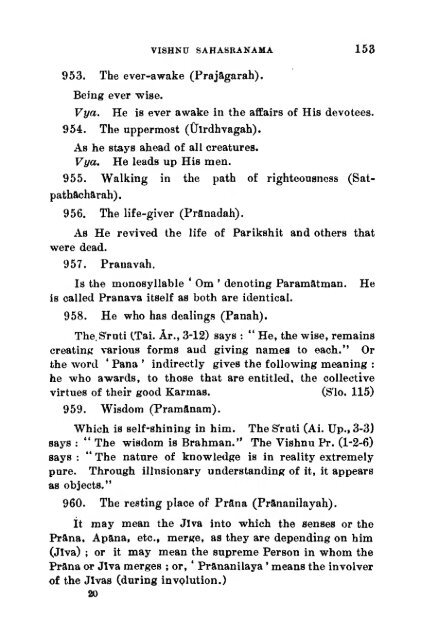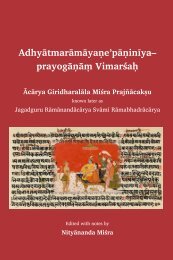Vishnu.Sahasranama.with.the.Bhasya.of.Sankaracharya_text
Vishnu.Sahasranama.with.the.Bhasya.of.Sankaracharya_text
Vishnu.Sahasranama.with.the.Bhasya.of.Sankaracharya_text
You also want an ePaper? Increase the reach of your titles
YUMPU automatically turns print PDFs into web optimized ePapers that Google loves.
VISHNU SAHASRANAMA 153<br />
953. The ever-awake (Prajagarah).<br />
Being ever wise.<br />
Vya. He is ever awake in <strong>the</strong> affairs <strong>of</strong> His devotees.<br />
954. The uppermost (Olrdhvagah).<br />
As he stays ahead <strong>of</strong> all creatures.<br />
Vya. He leads up His men.<br />
955. Walking in <strong>the</strong> path <strong>of</strong> righteousness (Sat-<br />
pathacharah).<br />
956. The life-giver (PrSnadah).<br />
As He revived <strong>the</strong> life <strong>of</strong> Parikshit and o<strong>the</strong>rs that<br />
were dead.<br />
957. Pranavah.<br />
Is <strong>the</strong> monosyllable ' Om<br />
' denoting Paramatman. He<br />
is called Pranava itself as both are identical.<br />
958. He who has dealings (Panah).<br />
The.S'ruti (.Tai. Ar., 3-12) says : " He, <strong>the</strong> wise, remains<br />
creating various forms and giving names to each." Or<br />
<strong>the</strong> word * Pana ' indirectly gives <strong>the</strong> following meaning :<br />
he who awards, to those that are entitled, <strong>the</strong> collective<br />
virtues <strong>of</strong> <strong>the</strong>ir good Karmas. (S'lo. 115)<br />
959. Wisdom (Pramftnam).<br />
Which is self-shining in him. The S'ruti (Ai. Up., 3-3)<br />
says : " The wisdom is Brahman." The <strong>Vishnu</strong> Pr. (1-2-6)<br />
says : " The nature <strong>of</strong> knowledge is in reality extremely<br />
pure. Through illnsionary understanding <strong>of</strong> it, it appears<br />
as objects."<br />
960. The resting place <strong>of</strong> Prana (Prananilayah)<br />
It may mean <strong>the</strong> Jlva into which <strong>the</strong> senses or <strong>the</strong><br />
Prana, Apana, etc., merge, as <strong>the</strong>y are depending on him<br />
(Jlva) ; or it may mean <strong>the</strong> supreme Person in whom <strong>the</strong><br />
Prana or Jlva merges ; or, ' Prananilaya ' means <strong>the</strong> involver<br />
<strong>of</strong> <strong>the</strong> JIvas (during involution.)<br />
.



